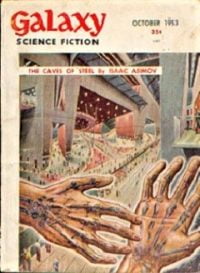
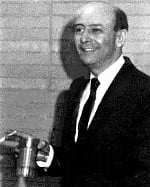 X Minus One (1955-58) aired “At the Post” on March 27, 1957 as its 94th episode. It first appeared in the October 1953 issue of Galaxy (cover at left) as a novelette by H. L. Gold (1914-1996, photo at right).
X Minus One (1955-58) aired “At the Post” on March 27, 1957 as its 94th episode. It first appeared in the October 1953 issue of Galaxy (cover at left) as a novelette by H. L. Gold (1914-1996, photo at right).
Consensus among radio historians has set the number of X Minus One episodes at 126 (counting rebroadcasts), with 119 in circulation. The show was cancelled on January 9, 1958 following its 126th episode, and was the longest running SF show in radio history (which isn’t saying much when you realize it didn’t make it through three years, while many other radio shows had successful runs of 8, 10, and even 20 years). It was an extension, or revival if you will, of Dimension X, which ran from April 1950 through September 1951, airing 50 episodes. The first 15 X Minus One shows were remakes of Dimension X adaptations of stories first appearing in Astounding Science Fiction, but after that the remaining shows were dramatizations of stories from Galaxy. For those trying to keep a chronology of the important adult SF series’ straight, here’s the breakdown:
2000 Plus — March 15, 1950
Dimension X — April 8, 1950
X Minus One — April 24, 1955
Exploring Tomorrow — December 4, 1957
H. (Horace) L. Gold was the first editor of Galaxy Science Fiction magazine (1950-1980). He would edit the magazine from its debut issue in October of 1950 through October of 1961, though his extreme agoraphobia and a taxi accident precluded him from leaving his apartment and doing little if any editorial work after 1960, when Frederik Pohl became, in essence, the magazine’s editor. Nevertheless, Gold’s name would remain on the masthead until the December 1961 issue, when Pohl was officially listed as the magazine’s editor.
“At the Post” is a…goofy sort of story. If focuses on a man who likes to gamble on the ponies, and his sick wife who is institutionalized with (as the husband puts it in a poor attempt to repeat what doctors have told him) “catatonia and dementia.” The storyline is kind of all over the place, but before long our gambler is convinced his wife’s OCD dance steps, repeated over and over and over, is the portal to another world or dimension, and eventually emulates them and enters said dimension. What he finds are humanoid aliens trying to decide if humanity is worthy of existence or not (a cliche in SF), and more oddball goings on. The logic of it all if you stand back and try to figure it out is pretty silly, but it makes for a fun story that keeps you listening to find out what craziness happens next.
Since June of 2009 when I began to offer these radio plays as a fun little side attraction and change of pace from the reviews and other features, I’ve presented all but a handful of the X Minus One episodes still in circulation. With well over 100 at your fingertips, there are only maybe 5 or 6 we haven’t gotten around to yet, which is why I’ve been presnting great old radio shows in the detective, mystery, and western genres the past year or more, and running the final few X Minus One shows sparingly, to make the series last as long as possible. So enjoy “At the Post” for what it is and give a smile as its lighthearted tale unfolds.
Play Time: 21:57
{Aside from the Cold War with the then Soviet Union, March of 1957 was a quiet time in America, a time of peace, suburban expansion, TV’s early Golden Age (not to mention TV dinners), and a welcome sense of relief and calm as prosperity covered the land. And prosperity made it a sure bet that the neighborhood gang would have plenty of nickels, dimes, and quarters jingling in their pockets as they headed for the closest newsstand or drugstore, there to find their favorite reading. If, Worlds of Science Fiction (1952-74) was to be the fantasy counterpart to Horace Gold’s highly popular new SF magazine Galaxy. And it was, for over 20 years. Fred Pohl was editor from 1962-69, a period many consider to be the magazine’s salad days, for under Pohl’s editorship If would win 3 consecutive Hugo Awards (1966-68). It was a bi-monthly in 1957. Infinity (November 1955-November 58) lasted but 20 issues and was able to squeeze out only 7 issues in 1957, but while it lasted was a viable outlet for many a top shelf author, though the overall quality of material that came its way was spotty. That said, its first issue carried a short story by Arthur C. Clarke titled “The Star.” It won the Hugo Award the next year and has gone on to become one of the canonical classics of the SF genre. Though If had a higher circulation in 1974 than its sister (and senior) magazine Galaxy, it was merged with Galaxy in January of 1975 due to financial considerations with it and Galaxy‘s parent company UPD. (The Original) Science Fiction Stories (1955-60) is the offspring of several magazines (sort of; it’s complicated), one that began in the late 1930s, went through a name change and folded in 1943, but was then revived in 1950 under the title Future Science Fiction (1950-60). In 1955 it was decided to rename the magazine Science Fiction Stories and Future Science Fiction was no more. But no sooner had the new magazine begun than it was decided to relaunch Future Science Fiction. Issue numbering was a challenge as Science Fiction Stories continued the numbering of the magazine from which it had sprung (after all, only the title had changed). It gets more confusing with the re-numbering of the quickly revived Future Science Fiction since its numbering system was continued under its new title of Science Fiction Stories. The solution was to return to the 1950 relaunch of Future Science Fiction and forego any volume numbers and just give a number to each issue. Thus, the May/June debut issue was retroactively now simply issue #1, while the re-re-launch in 1955 was #28. Confused? Don’t feel alone. It’s better just to enjoy the cover artwork and not worry about the numbers. Oh, and Science Fiction Stories was a bi-monthly in 1957.}
[Left: If, Feb. 1957 – Center: Infinity SF, Feb. 1957 – Right: Science Fiction Stories, March 1957]
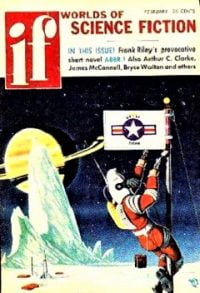
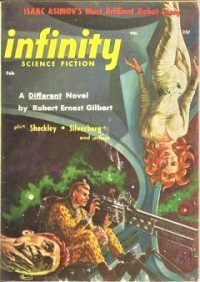
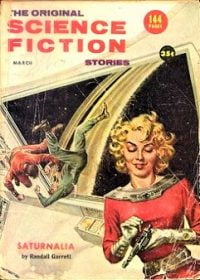
To view the entire list of weekly Old Time Radio episodes at Tangent Online, click here.